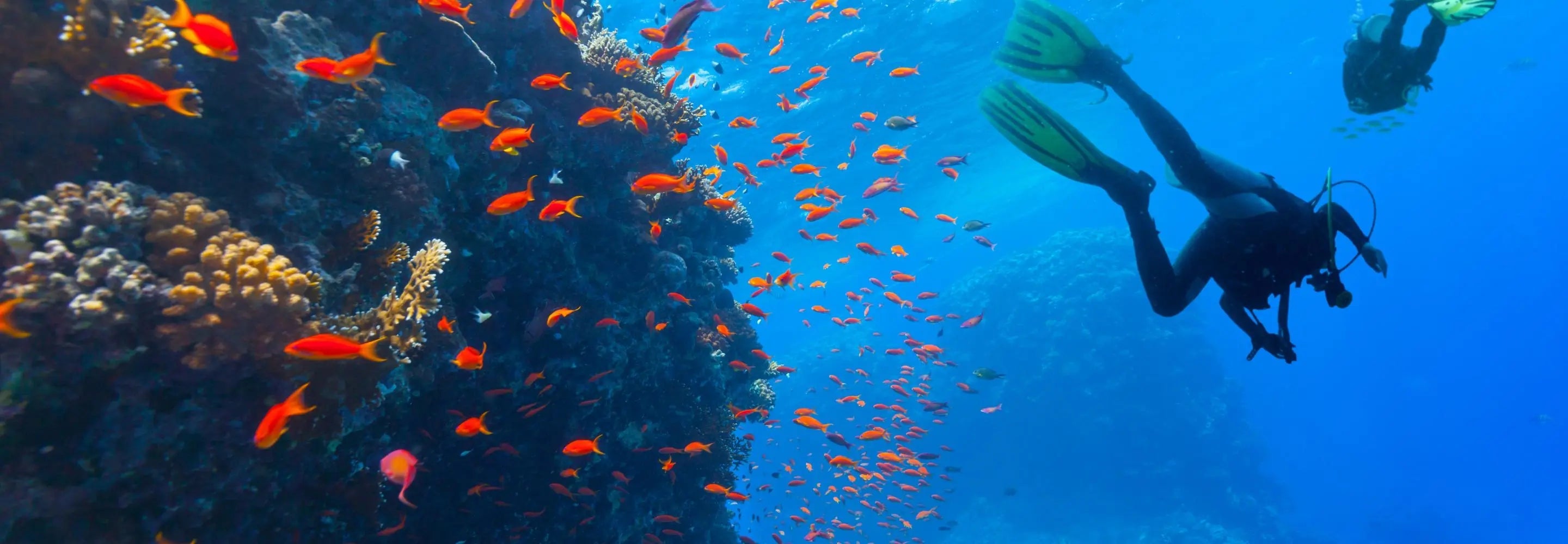As our planet's oceans face unprecedented challenges from pollution, climate change, and overexploitation, the need for conservation efforts has never been more urgent.
The ocean covers over 70% of the Earth's surface and is home to a dazzling array of life forms, many of which are yet to be discovered. However, human activities are taking a toll on this fragile ecosystem, threatening marine biodiversity and the balance of our planet's natural systems. From coral reefs teeming with life to vast underwater plains, every aspect of the ocean is interconnected and deserves protection.
Divers, with their unique access to these underwater realms, play a pivotal role in conservation efforts. They witness firsthand the beauty and vulnerability of marine life and can serve as ambassadors for change. By raising awareness, participating in clean-up initiatives, and advocating for sustainable practices, divers have the power to make a significant difference in the fight to protect our ocean planet.
Divers as Ocean Stewards

One of the most compelling aspects of being a diver is the unparalleled view it offers into the underwater world. Divers have a firsthand, immersive experience of marine environments that few others can fully appreciate. This perspective not only provides a sense of wonder but also comes with a responsibility to protect what we love.
Divers are not merely spectators of marine life; they are active participants in its preservation. Through diving, enthusiasts can directly observe and monitor the health of underwater ecosystems. By witnessing the conditions of coral reefs, kelp forests, or seagrass meadows up close, divers gain valuable insights into the state of these habitats.
Additionally, divers can leverage their unique perspective to educate others about the importance of ocean conservation. By sharing stories and photographs from their dives, they can raise awareness about the beauty and fragility of marine ecosystems. This outreach helps inspire others to take action in reducing their impact on the oceans and supporting sustainable practices.
Understanding Marine Conservation Issues

Marine life is facing a myriad of challenges due to human activities, posing significant threats to the health and sustainability of our oceans. As divers, understanding these challenges is crucial for effectively contributing to conservation efforts. Let's delve into some of the key issues affecting marine life and explore how divers can make a difference:
A. Coral Bleaching
Coral reefs are vibrant underwater ecosystems that support a vast array of marine biodiversity. However, these vital habitats are under immense stress due to coral bleaching, primarily caused by rising ocean temperatures driven by climate change. When corals are stressed, they expel the algae living within their tissues, resulting in a loss of color and eventually leading to coral death if conditions don't improve.
B. Plastic Pollution
Plastic pollution is a pervasive problem in our oceans, with devastating impacts on marine life. Every year, millions of tons of plastic waste enter marine environments, endangering marine animals through ingestion, entanglement, and habitat destruction.
C. Declining Fish Populations
Overfishing and destructive fishing practices have led to declines in fish populations worldwide. Unsustainable fishing methods, such as bottom trawling and bycatch, not only deplete fish stocks but also harm marine habitats and disrupt entire ecosystems.
Dive Responsibly: Leave No Trace
Diving offers unparalleled access to the wonders of the underwater world, but with this privilege comes the responsibility to minimize our impact on marine ecosystems. Adopting and promoting responsible diving practices is essential for ensuring the long-term health and sustainability of our ocean planet. Here's why responsible diving matters and how divers can make a positive difference:
A. Protecting Marine Life
Responsible diving prioritizes the well-being of marine life by minimizing disturbances and avoiding harmful interactions. One crucial aspect is practicing proper buoyancy control to prevent accidental contact with delicate corals and other marine organisms. Maintaining neutral buoyancy not only enhances diver safety and comfort but also safeguards fragile underwater habitats from unintentional damage.
Techniques for Reducing Ecological Footprint:
Buoyancy Control: Mastering buoyancy through training and practice enables divers to glide effortlessly over reefs without disturbing sediment or organisms. This skill minimizes the risk of inadvertently damaging fragile marine life.
Avoiding Touching Marine Life: Resist the temptation to touch or handle marine creatures, as this can disrupt their natural behaviors and even cause injury. Admire marine life from a respectful distance, allowing them to thrive undisturbed in their habitat.
B. Minimizing Pollution and Waste
Responsible divers strive to leave no trace underwater. This means carrying out any trash brought into the water and participating in clean-up dives to remove debris from marine environments. Avoiding single-use plastics and opting for reusable, eco-friendly diving gear also reduces the amount of waste generated during dive trips.
Techniques for Reducing Ecological Footprint:
Proper Gear Maintenance: Regularly inspect and maintain diving equipment to ensure it functions efficiently and does not leak contaminants into the water.
Using Eco-Friendly Products: Choose environmentally friendly alternatives for sunscreen, dive weights, and other diving essentials to minimize chemical pollution in marine ecosystems.
C. Being a Responsible Ambassador
Divers have the opportunity to inspire others and raise awareness about ocean conservation. By leading by example and advocating for responsible diving practices, enthusiasts can influence fellow divers and the wider community to prioritize environmental stewardship.
Techniques for Reducing Ecological Footprint:
Education and Outreach: Share knowledge and resources on responsible diving practices through social media, dive clubs, and community events to encourage positive behavior change.
Supporting Conservation Initiatives: Get involved in marine conservation projects, such as reef monitoring, marine protected area patrols, or beach clean-ups, to actively contribute to preserving ocean health.
Participating in Clean-up Initiatives

Underwater clean-ups play a crucial role in removing harmful debris from marine environments. Discarded fishing gear, plastic waste, and other debris pose serious threats to marine life, leading to entanglement, ingestion, and habitat destruction. Divers equipped with the right tools and training can safely retrieve debris from the ocean floor, preventing further harm to marine ecosystems.
By clearing away debris, divers contribute to the restoration of underwater habitats such as coral reefs, seagrass beds, and rocky substrates. Debris removal allows these habitats to recover and thrive, creating healthier environments for marine organisms to flourish. Restoring the balance of underwater ecosystems is essential for maintaining biodiversity and the overall health of our oceans.
Underwater clean-up efforts serve as powerful educational tools, raising awareness about the impacts of marine debris and encouraging behavior change. Divers often share their experiences and findings with local communities, businesses, and policymakers, advocating for sustainable practices and policies that reduce waste and protect marine environments.
Choosing Sustainable Dive Operators
When planning your next diving adventure, opting for eco-friendly and sustainable dive operators can significantly contribute to marine conservation efforts. By supporting businesses that prioritize environmental responsibility, you can enjoy unforgettable diving experiences while minimizing your impact on fragile marine ecosystems. Here are key criteria to consider when selecting dive operators committed to sustainability:
A. Commitment to Conservation
Look for dive operators that actively engage in conservation initiatives and support marine protection efforts. Choose operators who collaborate with local communities, conservation organizations, or research institutions to contribute to ocean conservation projects. A strong commitment to preserving marine biodiversity demonstrates a genuine dedication to responsible diving practices.
B. Sustainable Practices
Evaluate dive operators based on their adoption of sustainable practices that reduce environmental impact. Consider operators that implement eco-friendly measures such as:
Use of Reef-Safe Products: Choose operators that promote the use of reef-safe sunscreen and cleaning products to prevent chemical pollution in marine environments.
Waste Management: Inquire about waste management practices on dive boats and at dive centers. Operators should prioritize recycling, proper disposal of waste, and minimizing single-use plastics.
Energy Efficiency: Select operators that employ energy-efficient practices, such as using renewable energy sources or minimizing fuel consumption.
C. Responsible Diving Guidelines
Ensure that dive operators prioritize responsible diving guidelines to protect marine life and habitats. Look for operators that promote proper buoyancy control, discourage touching marine organisms, and adhere to established diving codes of conduct. Responsible operators prioritize diver safety while minimizing disturbances to fragile underwater ecosystems.
D. Support for Local Communities
Choose dive operators that support local communities through sustainable tourism practices. Operators should prioritize hiring local staff, sourcing products and services from local businesses, and contributing to community development initiatives. Supporting local economies fosters a sense of stewardship and promotes sustainable livelihoods in coastal areas.
E. Certification and Accreditation
Check for certifications and accreditations that demonstrate a dive operator's commitment to sustainability. Look for affiliations with organizations such as Green Fins, Blue Ocean Conservation, or Project AWARE, which promote responsible diving practices and environmental stewardship within the dive industry.
Supporting Marine Protected Areas (MPAs)

MPAs are designated areas of ocean where human activities are regulated or restricted to conserve and protect marine biodiversity. By limiting fishing, diving, and other potentially harmful activities within these areas, MPAs provide essential refuges for marine species to thrive and habitats to recover. They help maintain healthy populations of fish, coral reefs, sea turtles, and other marine life, which in turn benefits surrounding ecosystems.
Divers can make a difference by advocating for the establishment and expansion of MPAs. By supporting policies that protect marine habitats and species, divers contribute to the creation of more effective and extensive protected areas. Additionally, visiting established marine sanctuaries as responsible divers helps demonstrate the economic value of conservation and encourages ongoing protection efforts.
Using Conquest Maps for Protecting the Ocean

In the quest to protect our ocean planet, Conquest Maps is here to amplify people’s contributions to marine conservation. Divers can use Conquest Maps to precisely mark and document the locations of MPAs they have visited. This interactive mapping feature offers a visual representation of dive sites within protected area
Divers can also make use Conquest Maps to explore and discover new marine sanctuaries and protected areas worldwide. By identifying MPAs they wish to visit, divers can align their diving activities with conservation goals and prioritize supporting sustainable tourism practices. Planning future visits to MPAs promotes responsible diving and contributes to the protection of marine biodiversity.
Lastly, Conquest Maps can help divers can advocate for the preservation of MPAs and inspire others to participate in marine conservation efforts. By actively planning and promoting visits to designated conservation zones, divers demonstrate a commitment to protecting our ocean planet.
As we immerse ourselves beneath the waves, we witness the breathtaking beauty of coral reefs, the majesty of marine life, and the delicate balance of underwater ecosystems. This direct connection fosters a profound sense of responsibility to protect and preserve what we love.
Through responsible diving practices, such as proper buoyancy control, avoiding touching marine life, and supporting sustainable dive operators, divers actively minimize their impact on fragile marine environments. By participating in clean-up efforts, advocating for marine protected areas, and sharing our passion for ocean conservation, divers amplify their impact and inspire positive change.
Tools like Conquest Maps offer diverse capabilities to further document, share, and plan ocean conservation efforts. Sharing experiences and insights on Conquest Maps fosters collaboration and knowledge-sharing within the global diving community, inspiring more people to make a difference.









Share:
How to Plan a Family-Friendly Scuba Diving Vacation
Top Mistakes When Buying Your First Push Pin Map